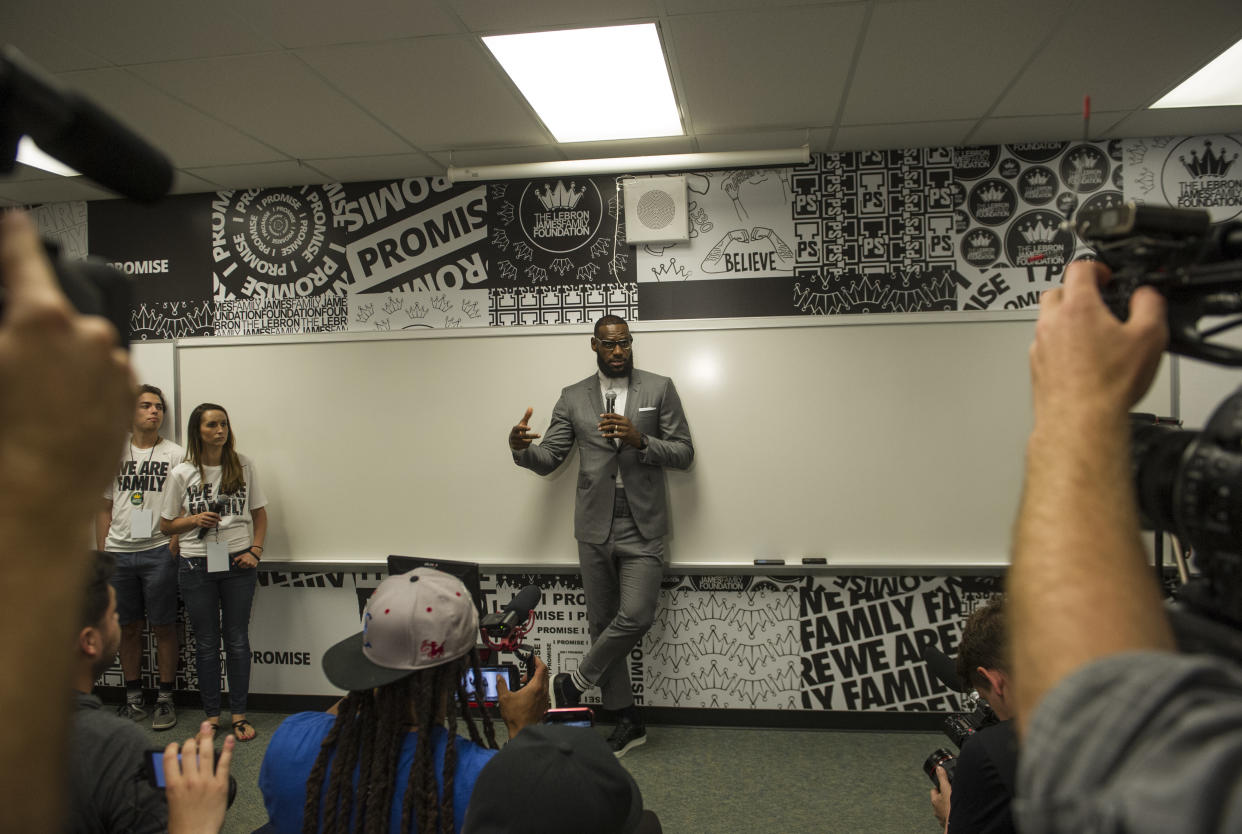LeBron James opened a new school that many are calling a 'game changer' — but what do educators really think?

On Monday, LeBron James opened his I Promise School in his hometown of Akron, Ohio. The school is designed to help some of the area’s students who are struggling with learning, as well as offer educational, career, and emotional support for parents.
“We are going to be that groundbreaking school that will be a nationally recognized model for urban and public school excellence,” I Promise principal Brandi Davis said, according to USA Today. “We are letting people know it is about true wraparound support, true family integration, and true compassion.”
The school — a partnership between Akron Public Schools and the LeBron James Family Foundation — is currently serving 240 third- and fourth-graders, with plans to expand to second and fifth grade next year, according to the foundation. By 2022, the school plans to have students in first through eighth grades. It specifically targets students who are at-risk in reading and who have been identified as needing additional academic intervention before they fall further behind their peers, the foundation says.
“Looking at reading data, we identified students who were a year, two years behind in reading,” Keith Liechty, the Akron Public Schools liaison to James’s foundation, told USA Today. “From that, we had more than 120 kids. We had to put a cap on it so we could fit under one roof. We did a random selection of all students who met that criteria and got to make these awesome phone calls to parents and say, ‘How would you like to be part of something different, the I Promise School?”
The concept is definitely new, and it has potential, Erin Casey, PhD, an assistant professor of elementary education at Louisiana State University, tells Yahoo Lifestyle. She especially likes the concept of promises that the school utilizes, namely that kids promise to try to work hard and do their best so that they can graduate from high school. “Promises represent the ultimate form of goal-setting,” she says. In many children whose parents didn’t graduate high school, goals like getting your homework done every day or aiming to graduate aren’t necessarily spoken of, Casey says. “These little goals add up to bigger accomplishments later in life,” she says.
The potential is definitely there, Kristy Cooper Stein, EdD, an associate professor in the Department of Educational Administration at Michigan State University, tells Yahoo Lifestyle, but it’s always tough to institute a new model in education. Ultimately, who is running the school and how learning is approached will make a big difference, she says. “If they’re doing something that is unique, it could engage students who haven’t been engaged before,” she says. “But just because these kids are together doesn’t mean it’s going to be effective.”
The mental health aspect of being around kids in a similar situation is huge, licensed clinical psychologist John Mayer, PhD, author of Family Fit: Find Your Balance in Life, tells Yahoo Lifestyle. He lists increased self-esteem, positive role models, the potential for lessened teasing and bullying, and positive peer relations as potential benefits.
Sometimes the standard model of education just doesn’t work for certain kids, and putting them in an environment where the method of teaching is tailored to their needs should help, Casey says. “The fact that these kids are a little behind shows that they need a different approach and something special,” she says. “I like that the educators will be looking for better and more successful ways to teach them.”
The concept of the school “sounds wonderful,” Linda Leibowitz, associate director of the University of Pennsylvania’s Executive Program in School and Mental Health Counseling, tells Yahoo Lifestyle. “My gut feeling is this sounds great because there’s an energy and they’re trying to engage the community and parents,” she says. But it’s also important to find out why these kids aren’t doing well in reading and other areas of schooling, Leibowitz says, citing environmental, mental health, traumas, and crisis issues as potential reasons. “You could have kids who aren’t reading for various reasons,” she says. “Are they focused on what these reasons are?”
The only other potential downside to the school is that not everyone who could benefit from the school will make it in, Casey says. (Students are randomly selected for admission once they qualify.) Still, if the school is successful, it could set a model that may be beneficial to other schools in the future, she says.
Read more from Yahoo Lifestyle:
Follow us on Instagram, Facebook, and Twitter for nonstop inspiration delivered fresh to your feed, every day.


